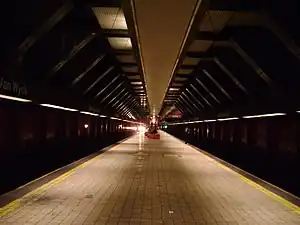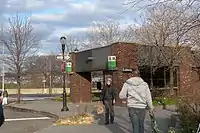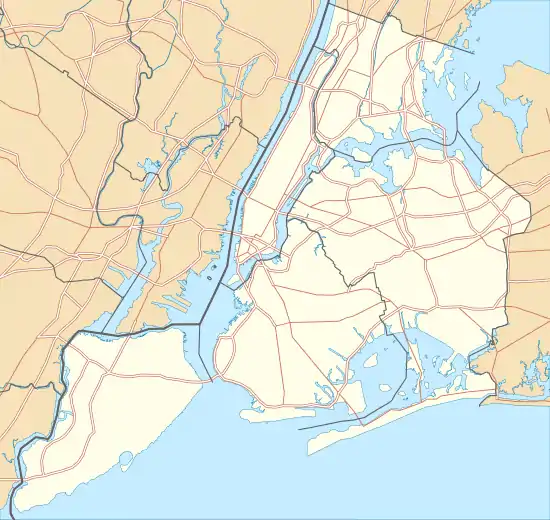Jamaica–Van Wyck station
The Jamaica–Van Wyck station (/væn ˈwɪk/ van WIK)[5] is a station on the IND Archer Avenue Line of the New York City Subway, located on the west side of the Van Wyck Expressway between Metropolitan Avenue and 89th Avenue on the border of Kew Gardens and Richmond Hill, Queens. It is served by the E train at all times.
Jamaica–Van Wyck | ||||||||||||||||||||||||||||||||||||||||||||||||||||||||||||||||||||||||||||||||||
|---|---|---|---|---|---|---|---|---|---|---|---|---|---|---|---|---|---|---|---|---|---|---|---|---|---|---|---|---|---|---|---|---|---|---|---|---|---|---|---|---|---|---|---|---|---|---|---|---|---|---|---|---|---|---|---|---|---|---|---|---|---|---|---|---|---|---|---|---|---|---|---|---|---|---|---|---|---|---|---|---|---|---|
 Station platform | ||||||||||||||||||||||||||||||||||||||||||||||||||||||||||||||||||||||||||||||||||
| Station statistics | ||||||||||||||||||||||||||||||||||||||||||||||||||||||||||||||||||||||||||||||||||
| Address | West side of Van Wyck Expressway between Metropolitan Avenue & 89th Avenue Queens, NY 11418[1] | |||||||||||||||||||||||||||||||||||||||||||||||||||||||||||||||||||||||||||||||||
| Borough | Queens | |||||||||||||||||||||||||||||||||||||||||||||||||||||||||||||||||||||||||||||||||
| Locale | Kew Gardens, Richmond Hill | |||||||||||||||||||||||||||||||||||||||||||||||||||||||||||||||||||||||||||||||||
| Coordinates | 40.701905°N 73.81656°W | |||||||||||||||||||||||||||||||||||||||||||||||||||||||||||||||||||||||||||||||||
| Division | B (IND)[2] | |||||||||||||||||||||||||||||||||||||||||||||||||||||||||||||||||||||||||||||||||
| Line | IND Archer Avenue Line | |||||||||||||||||||||||||||||||||||||||||||||||||||||||||||||||||||||||||||||||||
| Services | E | |||||||||||||||||||||||||||||||||||||||||||||||||||||||||||||||||||||||||||||||||
| Transit | ||||||||||||||||||||||||||||||||||||||||||||||||||||||||||||||||||||||||||||||||||
| Structure | Underground | |||||||||||||||||||||||||||||||||||||||||||||||||||||||||||||||||||||||||||||||||
| Platforms | 1 island platform | |||||||||||||||||||||||||||||||||||||||||||||||||||||||||||||||||||||||||||||||||
| Tracks | 2 | |||||||||||||||||||||||||||||||||||||||||||||||||||||||||||||||||||||||||||||||||
| Other information | ||||||||||||||||||||||||||||||||||||||||||||||||||||||||||||||||||||||||||||||||||
| Opened | December 11, 1988 | |||||||||||||||||||||||||||||||||||||||||||||||||||||||||||||||||||||||||||||||||
| Accessible | ||||||||||||||||||||||||||||||||||||||||||||||||||||||||||||||||||||||||||||||||||
| Opposite- direction transfer | Yes | |||||||||||||||||||||||||||||||||||||||||||||||||||||||||||||||||||||||||||||||||
| Traffic | ||||||||||||||||||||||||||||||||||||||||||||||||||||||||||||||||||||||||||||||||||
| 2019 | 1,412,179[4] | |||||||||||||||||||||||||||||||||||||||||||||||||||||||||||||||||||||||||||||||||
| Rank | 306 out of 424[4] | |||||||||||||||||||||||||||||||||||||||||||||||||||||||||||||||||||||||||||||||||
| ||||||||||||||||||||||||||||||||||||||||||||||||||||||||||||||||||||||||||||||||||
| ||||||||||||||||||||||||||||||||||||||||||||||||||||||||||||||||||||||||||||||||||
| ||||||||||||||||||||||||||||||||||||||||||||||||||||||||||||||||||||||||||||||||||
| ||||||||||||||||||||||||||||||||||||||||||||||||||||||||||||||||||||||||||||||||||
| ||||||||||||||||||||||||||||||||||||||||||||||||||||||||||||||||||||||||||||||||||
History
Planning and opening
_06.jpg.webp)
The plans for the Archer Avenue Lines emerged in the 1960s under the city and MTA's Program for Action.[6] It was conceived as an expansion of IND Queens Boulevard Line service to a "Southeast Queens" line along the right-of-way of the Long Island Rail Road Atlantic Branch towards Locust Manor, and as a replacement for the dilapidated eastern portions of the elevated BMT Jamaica Line within the Jamaica business district which business owners and residents sought removal of. Both lines would meet at the double-decked line under Archer Avenue. The two-track spur from the Queens Boulevard Line would use the original Van Wyck Boulevard bellmouths.[7][8][9][6] The IND line was to continue as a two-track line along the LIRR Atlantic Branch. It would have run through Locust Manor and Laurelton stations, with stops at Sutphin Boulevard, Parsons Boulevard (which was called Standard Place in planning documents), Linden Boulevard, Baisley Boulevard, and Springfield Boulevard.[10]
Design on the station began on October 1, 1974, and was completed on August 18, 1982, by MLA/Brodsky.[11]: 15 Construction on Section 7 of Route 131D, the Southeast Queens Line, which included the Jamaica–Van Wyck station started on October 17, 1979. At this point, the segment of the Archer Avenue Line under the Van Wyck Expressway had been completed.[12] Because of the 1975 New York City fiscal crisis, the Archer Avenue Line was never fully built to Springfield Boulevard, and was instead truncated to Parsons Boulevard. The shortened version of the line contained three stations, including Jamaica–Van Wyck, and was 2 miles (3.2 km) long.[13] Bids for the station project were received on December 3, 1982, and the project was awarded to Carlin Construction & Development Corporation for $12.781 million. Work on the station began on December 15, 1982.[11]: 15 The station opened along with the rest of the Archer Avenue Line on December 11, 1988.[14][13] It serves as the replacement for the former Metropolitan Avenue and Queens Boulevard stations of the BMT Jamaica Line.
Later years
To save energy, the MTA installed variable-speed escalators at Jamaica–Van Wyck and three other subway stations in August 2008,[15] although not all of the escalators initially functioned as intended.[16]
In 2020, the MTA announced that it would reconstruct the track and third rail on the IND Archer Avenue Line, which had become deteriorated. From September 19 to November 2, 2020, E service was cut back to Jamaica–Van Wyck, with a shuttle bus connecting to Sutphin Boulevard and Jamaica Center.[17][18]
Station layout
| Ground | Street level | Exit/entrance |
| Mezzanine | Mezzanine | Fare control, station agents |
| Platform level | Inbound[note 1] | ← |
| Island platform | ||
| Outbound[note 2] | | |
This underground station has two tracks and a 600-foot-long (180 m) island platform.[12][19] As planned, the island platform was to be 25 feet (7.6 m) wide.[20] The E stops here at all times.[21] The next stop to the west is Kew Gardens–Union Turnpike on weekdays during the day and Briarwood at other times. The next stop to the east is Sutphin Boulevard–Archer Avenue–JFK Airport.[22] As with other stations constructed as part of the Program for Action, the Jamaica–Van Wyck station contained technologically advanced features such as air-cooling, noise insulation, CCTV monitors, public announcement systems, electronic platform signage, and escalator and elevator entrances.[20] This station has five escalators and two elevators.[11]: 15
The track walls are mostly orange. The mezzanine is suspended above the Jamaica-bound track via heavy cables linked to the station roof. On the Manhattan-bound side, the station walls contain spaces for skylights to allow natural sunlight in,[20] but they are currently covered over.
North (railroad south) of the station, the tracks lead trains to the IND Queens Boulevard Line, where they either switch to the line's local or express tracks depending on the time of day.[19]
Exits

The Jamaica–Van Wyck station has two entrances.[12] One entrance is at the southwest corner of Van Wyck Expressway and 89th Avenue next to Jamaica Hospital Medical Center. This contains two escalators, an elevator, and one stair to street level. The other entrance is at Metropolitan Avenue and Jamaica Avenue, and contains one up-only escalator and a street stair. Two escalators and one staircase connect the platform with the mezzanine.[23]
Notes
- This track is actually for trains going compass northbound, but its railroad direction is southbound.
- This track is actually for trains going compass southbound, but its railroad direction is northbound.
References
- "Borough of Queens, New York City". Government of New York City. Retrieved June 21, 2020.
- "Glossary". Second Avenue Subway Supplemental Draft Environmental Impact Statement (SDEIS) (PDF). Vol. 1. Metropolitan Transportation Authority. March 4, 2003. pp. 1–2. Archived from the original (PDF) on February 26, 2021. Retrieved January 1, 2021.
- "Queens Bus Map" (PDF). Metropolitan Transportation Authority. August 2022. Retrieved September 29, 2022.
- "Facts and Figures: Annual Subway Ridership 2014–2019". Metropolitan Transportation Authority. 2020. Retrieved May 26, 2020.
- Bilefsky, Dan (May 26, 2011). "Stuck on the Van Wyck Expressway? Just Try to Pronounce It". The New York Times. p. A28. Retrieved June 20, 2012.
- Metropolitan transportation, a program for action. Report to Nelson A. Rockefeller, Governor of New York. New York. November 7, 1967. Retrieved October 1, 2015 – via Internet archive.
- Burks, Edward C. (October 24, 1973). "Work Begun on Queens Subway Extension" (PDF). The New York Times. Retrieved September 26, 2015.
- nycsubway.org—The 1968 MTA "Program for Action"
- Dembart, Lee (September 9, 1977). "A Sentimental Journey on the BMT..." (PDF). The New York Times. Retrieved July 2, 2015.
- "1.bp.blogspot.com/-KeE0zA-o9eQ/UkwMlD5iQgI/AAAAAAAACtM/rJZIo37CvK8/s640/southwest_route.jpg".
- "Archer Avenue Extension Ceremony 1988". New York City Transit Authority. December 1988.
{{cite web}}: Missing or empty|url=(help) - "New Subway Line" (PDF). Glendale Register. October 25, 1979. p. 11. Retrieved July 25, 2016 – via fultonhistory.com.
- Johnson, Kirk (December 9, 1988). "Big Changes For Subways Are to Begin". The New York Times. Retrieved July 14, 2015.
- Anders, Marjorie; Associated Press (December 11, 1988). "Subways get biggest change since 1904" (PDF). Nyack Journal News. p. I1. Retrieved July 25, 2016 – via fultonhistory.com.
- Chan, Sewell (August 6, 2008). "M.T.A. Rolls Out Escalators With Conservation Features". The New York Times. ISSN 0362-4331. Retrieved October 10, 2022.
- Chan, Sewell (August 11, 2008). "Bumpy Start for 'Green' Subway Escalators". The New York Times. Retrieved October 10, 2022.
- "Press Release - NYC Transit - MTA to Perform Critical Track Replacement Work at End of E Line in Queens Next Month". MTA. August 17, 2020. Archived from the original on August 18, 2020. Retrieved August 18, 2020.
- Pozarycki, Robert (August 28, 2020). "Two Queens meetings on major track work at end of E line in Jamaica". amNewYork. Archived from the original on September 29, 2020. Retrieved September 19, 2020.
- Dougherty, Peter (2006) [2002]. Tracks of the New York City Subway 2006 (3rd ed.). Dougherty. OCLC 49777633 – via Google Books.
- Burks, Edward C. (August 7, 1976). "New York Improving Subways, But Still Trails Foreign Cities". The New York Times. ISSN 0362-4331. Retrieved July 14, 2022.
- "E Subway Timetable, Effective December 4, 2022". Metropolitan Transportation Authority. Retrieved August 26, 2023.
- "Subway Map" (PDF). Metropolitan Transportation Authority. September 2021. Retrieved September 17, 2021.
- "Jamaica—Van Wyck Neighborhood Map". mta.info. Metropolitan Transportation Authority. April 2018. Retrieved December 28, 2020.
External links
- nycsubway.org – IND Queens Boulevard Line: Jamaica/Van Wyck
- Station Reporter — E Train
- The Subway Nut — Jamaica–Van Wyck Pictures
- Metropolitan Avenue entrance from Google Maps Street View
- 89th Avenue entrance from Google Maps Street View
- Platform from Google Maps Street View


